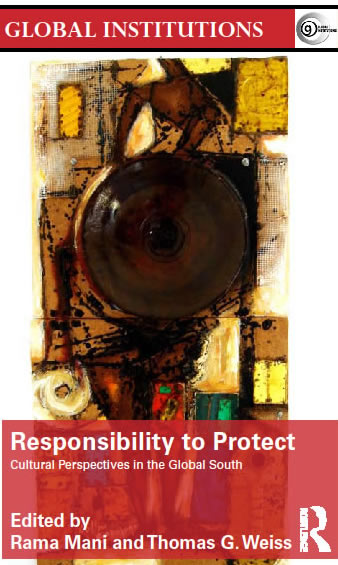
Book review: “Responsibility to Protect: Cultural Perspectives in the Global South” by Rama Mani and Thomas G. Weiss (eds.)
In an interesting contribution, Rama Mani and Thomas G. Weiss have edited a collection of essays that analyze the responsibility to protect using different disciplines, ranging from religion, philosophy, aesthetics and anthropology.
Critics may point out that the book’s title, “Cultural Perspectives in the Global South” may suggest that the points of views presented can somehow represent the ‘Global South’ as a whole. Indeed, in the first pages the authors describe Mohamed Sahhoun, an Algerian diplomat, as “the Southern voice of wisdom within ICISS” (International Commission on Intervention and State). Yet Mani and Weiss are careful to point out that the case studies presented are in no way exhaustive or definitive – rather, they represent a genuine attempt to hear perspectives usually overlooked in the general debate – a courageous yet important step in a debate that is often restricted to New York and the elites in a few capitals around the world.
Despite the inevitable oversimplification the distinction between Global North and Global South creates, it remains useful. As Rahul Rao writes in his recent book “Third World Protest” (reviewed here), the debate about the changing nature of sovereignty is really a debate about the changing nature of sovereignty in developing countries: Atrocities occur in non-Western regions, while the West intervenes. This is mostly correct, but also fails to reflect a far more complex reality, in which countries in the Global South such as Nigeria often assume leadership and support interventions in Western Africa. In the same way, several Arab nations have been the most assertive proponents of intervention in Libya in 2011.
The contributions by authors from the Democratic Republic of Congo (DRC), Mexico, Rwanda, Nepal and elsewhere pose a double challenge to readers used to globally streamlined policy talk. Not only do the contributors hail from disciplines other than political science, but they are also writing from a distinctly local perspective. Mutombo Nkulu-N’Sengha points out that R2P is aligned with all religious beliefs around the world, yet his analysis remains somewhat abstract. Yolanda Angulo Parra demonstrates how both Western and non-Western philosophy and ethics support R2P – hardly a surprise.
Rama Mani’s analysis on the artistic responses to mass atrocities, on the oher hand, provides a very useful overview over how societies across the world deal with and express the experience of large-scale loss and destruction. Yet art may also be important in the context of improving global prevention: Mani argues that “cultural repression and the execution of artists are usually not considered threats to international peace and security and they are relegated to cultural organizations without political clout.” However, they can be “portents of impending disaster”. This may have some relevance for policy makers who seek to improve preventive efforts – possibly by taking a more holistic approach.
Jean-Marie Kayishema’s chapter on the Rwandan genocide and its aftermath presents possibilities to develop unifying cultural elements that help forge a sense of social cohesion between Hutus and Tutsis. Nita Luci argues that it is only with a solid understanding of local culture that R2P policies towards prevention and reaction to atrocities can be effective. Arjun Karki’s and Jyoti Upadhyay’s analysis of the prevention of large-scale violence in Nepal is particularly interesting because they argue that despite the presence of national, regional and international actors, it was local actors who were decisive in preventing atrocities.
In sum, Responsibility to Protect: Cultural Perspectives in the Global South provides an interesting attempt to provide an understanding of R2P in the realm of religion, culture and art in a series of countries affected by mass atrocities. One of the lessons of the book is that particularly when it comes to long-term prevention and rebuilding, local culture can be a powerful tool.
Read also:
Book review: “Global Politics and the Responsibility to Protect” by Alex J. Bellamy
Book review: “From the Ruins of Empire” by Pankaj Mishra
New article: “Identity and the concept of the West: The case of Brazil and India”
Towards democratic internationalism in a post-exceptionalist era?








